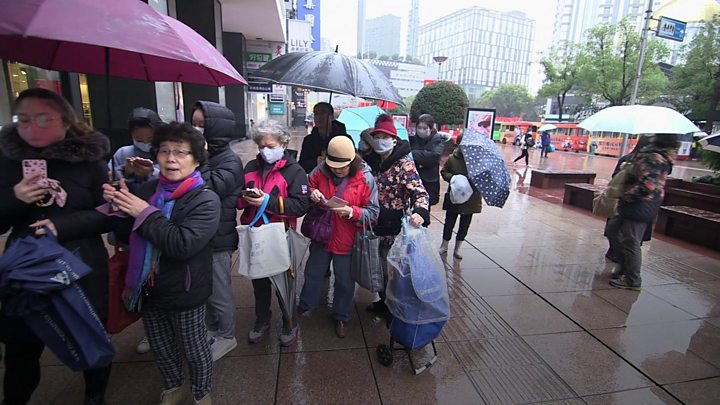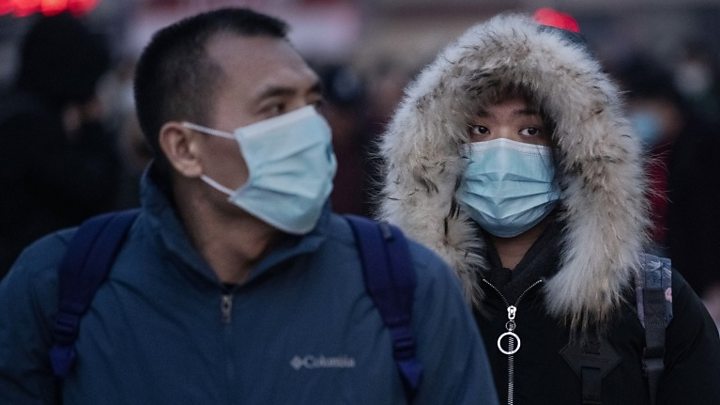
Media playback is unsupported on your device
China is battling to contain a deadly coronavirus in its Hubei province, as hundreds of millions of Chinese prepare to travel over the Lunar New Year.
Beijing and Hong Kong have cancelled some major festivities to prevent large crowds gathering together.
Wuhan and other cities in Hubei have seen far more draconian measures, with curbs on public transport.
All but one of the 18 deaths have been in Hubei, but there are more than 600 cases, including several abroad.
It was the low number of confirmed cases overseas – currently 12 – that was one of the reasons the World Health Organization (WHO) on Thursday declined to designate the virus an “international emergency”.
“It may yet become one,” said the WHO’s boss.
The US said on Thursday it was investigating its second suspected case.
What are the fears for Lunar New Year?
It is one of the world’s largest annual migrations of people.
The authorities have cancelled all large-scale celebrations in Beijing. Temple fairs are banned, film releases postponed and the Forbidden City will be closed to the public.
Hong Kong cancelled an international carnival and an annual football tournament. Acting chief executive Matthew Cheung said it was “not appropriate to have crowds of people gathering together”.
Image copyright
Getty Images
Masks are commonly worn in Hong Kong, where authorities have faced criticism
The Chinese government’s massive lockdown of the city of Wuhan, where the virus was first detected, and similar measures for at least five other provincial cities earned the praise of the WHO.
China has effectively quarantined nearly 20 million people in Hubei province, with no planes or trains in or out of Wuhan. Cities have been hit by closures of cafes, cinemas, theatres and exhibitions.
There have been long queues – and some squabbling – at food stores for diminishing stocks.
Face masks are compulsory in all public places in Wuhan and some residents are saying it is like a ghost town.
But the BBC’s Stephen McDonell, in Beijing, says that many hundreds of thousands of residents have already left Wuhan to celebrate the Lunar New Year elsewhere and, with an incubation period of around five days, they may have unwillingly passed on the virus without even knowing it.

Media playback is unsupported on your device
There are 634 confirmed cases in China, although most are in Hubei, according to official reports. However, the death of an 80-year-old man in Hebei province, near Beijing – the first outside Hubei – was a reminder of the threat.
Experts in Hong Kong have complained not enough has been done there, in particular the checking of arrivals from the mainland. Macau has ordered 20 million face masks to be sold at a low price and Hong Kong has been urged to give them away free. Both territories have confirmed cases.
What do we know about the virus?
Currently known as 2019-nCoV, the virus is understood to be a new strain of coronavirus not previously identified in humans. The Sars (Severe Acute Respiratory Syndrome) virus that killed nearly 800 people globally in the early 2000s was also a coronavirus, as is the common cold.

Media playback is unsupported on your device
Authorities have said this new virus originated in a seafood market in Wuhan that “conducted illegal transactions of wild animals”.
There is evidence of human-to-human transmission, with the virus spreading from patients to family members and healthcare workers.
The virus infects the lungs, and symptoms start with a fever and cough. It can progress to shortness of breath and breathing difficulties.
There is no vaccine as yet, though three research teams are working on one.
Why is this not a global emergency?
Analysis by James Gallagher, BBC health and science correspondent
The view of the WHO’s emergency committee was “now is not the time”. Two reasons were cited: the limited number of cases abroad and the “efforts made by China”.
The latter seems to be a nod to the lockdown of multiple cities in the past 24 hours, which should minimise the risk of the virus becoming a global problem. But it may yet become one.
Some scientific details were also released, with the WHO saying 25% of reported cases were developing severe symptoms.
And there were two clues on how infectious the novel coronavirus is.
There is a preliminary estimate of the average number of people each infected person passes the virus on to (known as the R0 value) of between 1.4 and 2.5.
Any number greater than one means the virus has the potential to spread in the population, but this is lower than the figure for Sars.
And in Wuhan a “fourth-generation case” has been detected – this is a sustained chain of transmission involving four people.
It remains too early to call the true extent of human-to-human transmission.
What’s the global situation?
Vietnam and Singapore were on Thursday added to the nations and overseas territories recording confirmed cases, joining Thailand, the US, Taiwan and South Korea. Japan confirmed its second case on Thursday.
There are only 12 such cases overall, with Thailand’s four the most of any nation other than China.
Other nations are investigating suspected cases, including the UK and Canada.
On Thursday, US authorities said a second suspected case was being investigated, in the state of Texas.
A health official said the patient had travelled from Wuhan and was a student at Texas A&M University, north of Houston.
The only confirmed case in the US so far is a man in Seattle, Washington state. He is said to be recovering and is due to be released from hospital.
Many authorities have announced screening measures for passengers from China, including on Thursday the major airport hubs of Dubai and Abu Dhabi.
Taiwan has banned people arriving from Wuhan and the US state department warned American travellers to exercise increased caution in China.
Learn more about the new virus
Image copyright
Getty
Are you in Wuhan? Have you been affected by the lockdown? Email haveyoursay@bbc.co.uk.
Please include a contact number if you are willing to speak to a BBC journalist. You can also contact us in the following ways:
Source link







